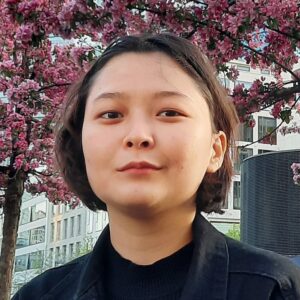The beginning of my interest in research traces back to my school days, a period when I had the privilege of studying at one of the most esteemed schools in my country— the Nazarbayev Intellectual School. The school’s admission process, primarily conducted through competitive testing aligned with the Cambridge education system, was an honor that set the stage for my academic journey. The initiation of my scientific endeavors took shape with a quantitative study on the increasing trend of the corruption level in Kazakhstan at Al-Farabi Kazakh National University which equipped me with indispensable knowledge and skills related to large-scale research. My enthusiasm for the field of international relations sprouted during my school years as part of a Global Perspective course and Research course. This course not only provided insights into the United Nations, its goals, and operational principles but also sparked my research on the detrimental consequences of the economic dependence of Kazakhstan on oil.
My academic journey at Maqsut Narikbayev University, within the International Relations program, was a deliberate pursuit aimed at comprehending the functions of International Organizations and regionalism. Concurrently, it offered the opportunity to delve into the study of German language. Over the course of my undergraduate studies, my academic performance resulted in the highest GPA in the course for three consecutive years. This achievement placed me in the esteemed list of the top 10% of students with the best academic performance, earning the distinguished Provost’s List nomination.
In my second year at university, I delivered a presentation at the “Voice of Youth: Uniting the World to Tackle the Climate Change” debate sponsored by the UN Resident Coordinator Office with a project on ways to reduce greenhouse gas emissions over this decade. Further, while studying at the university, I was honored to undergo an internship at the Ministry of Foreign Affairs of Kazakhstan, which allowed me to become familiar with the system of work of this government and to establish meaningful connections with professionals in the field. In my third year, I embarked on an internship at the Conference on Interaction and Confidence-Building Measures in Asia (CICA). This experience honed my skills in writing notes verbal’s and official letters, while also exposing me to the implementation of investment projects utilizing digital innovations for sustainable development in the Pacific-Asian region.
Another milestone in my academic journey was the academic mobility program sponsored by the Erasmus+ Fund at The Philipps University of Marburg. The selection of my candidacy was based on a high proficiency in English language, outstanding academic performance, and commendable recommendations from teachers, including Professor Willy Kempel—an esteemed Ambassador of Austria to the Republic of Kazakhstan.
An additional enriching experience was my participation in the third Summer School of Regionalism in Indonesia at Airalangga University. This platform facilitated connections with eminent scholars, including Nari Shelekpayev, a tenure-track Assistant Professor at the Department of Slavic Languages and Literatures at Yale University. In the same year, I had the honor of participating in the German-Kazakh-Ukrainian seminar on administrative law held in Regensburg, Germany. This seminar expanded my knowledge in the field of administrative jurisdiction, provided an opportunity to present my report, and delved into the prospects for its further development in Kazakhstan.
This year, I had the privilege of co-authoring and defending a research paper alongside students from the Law School of Maqsut Narikbayev University. Our research explored the ethical, practical, and legal implications of artificial intelligence, a topic of significant contemporary relevance. Our team’s efforts were recognized with the Grand Prix award, and as a result, I was granted the opportunity to attend a summer school course on International Law and Security at the University of Utrecht in the Netherlands. This experience has not only expanded my expertise in international law but also deepened my understanding of the legal challenges surrounding emerging technologies on a global scale.
My interest in the Special program on Japanese and Eurasian studies at Tsukuba University stems from my enduring aspiration to contribute to the resolution of social and environmental issues in my region. This commitment was fueled by my two-year tenure as the President of the student organization League of Volunteers KAZGUU, where I recognized the insufficient public awareness regarding sustainable development in Kazakhstan. Furthermore, the recommendation of the Japanese educational system by my professor in Foreign Policy Analysis, Bitabarova A.G., a Ph.D. candidate in International Relations at Hokkaido University, served as a catalyst for my interest.
The pursuit of The Nippon Foundation JACAFA Foundation Eurasia Scholarship Program is motivated by my aspiration to deepen my knowledge in the field of International Relations and identify successful practices to propose possible methods for enhancing policies related to education in my country, because Japan is an example of an inclusive higher education institution that provides high-quality knowledge in the field of international cooperation and the study of international organizations, which also contributes to the achievement of sustainable development goals. Obtaining a Master’s degree under the The Nippon Foundation JACAFA Foundation Eurasia Scholarship Program will increase my competitiveness in the job market and will allow me to contribute to the exchange of knowledge and skills between Japan and Kazakhstan, as after completing my education I aspire to apply for a position of the university professor at MNU and contribute to the development of Central Asian scholarship.




